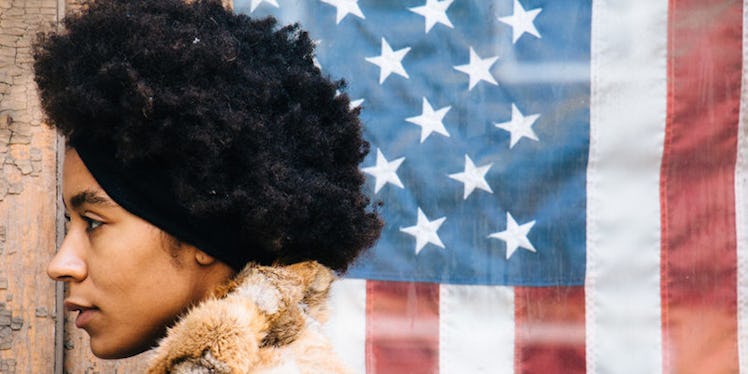
Why Trying To Stay 'Respectable' Ultimately Hurts All Black Women
Every woman I know fears of saying the wrong thing in front of a boss or styling our hair the "wrong" way for some fancy event. For many black women, that same fear is compounded with a long history of respectability politics for blacks.
The politics of respectability, a term first coined by Evelyn Brooks Higginbotham as a chapter in her book, "Righteous Discontent: The Women's Movement in the Black Baptist Church, 1880-1920," reach back to the 19th century. A group of women broke away from the Baptist convention to form the Women's Convention and established a set of rules for working class blacks to follow.
For women, these regulations included dressing modestly, speaking coherently and restraining their sexuality in public as to not embarrass the black community and earn respect from mainstream culture. Back then, these rules were put in place as a means of survival. However, the repercussions of this self-policing behavior negatively affect us today.
Similar to feminism that isn't intersectional, respectability politics doesn't allow society to fully accept and celebrate black women, hindering us from self-love.
Instead of denouncing or challenging mainstream culture for failing to accept us, black women conform to general social norms like hiding our curves and code-switching.
The effects of respectability politics are deeply problematic and cripple black women's magic -- here's how.
We lose control of our own bodies.
At an early age, black women are taught to cover up. My grandmother would probably clutch her pearls if she caught me in short-shorts, let alone anything above the knee.
Ayesha Curry, the wife of NBA great Stephen Curry, was recently under fire for shaming women who show "too much skin." She denounced the current fashion trends, saying she prefers "keeping the good stuff covered up" for her husband. Later, Black Twitter spun Curry's tweets into a virgin-vs-whore rhetoric following Kim Kardashian's nude selfie.
Everyone's into barely wearing clothes these days huh? Not my style. I like to keep the good stuff covered up for the one who matters — Ayesha Curry (@ayeshacurry) December 6, 2015
Though Curry's tweet was steeped in her religious beliefs, the sentiment still plays into respectability politics. She perpetuates the notion that black women who cover up deserve more respect than women who show a little more thigh. She goes on to say she prefers "classy over trendy," further suggesting women who aren't in floor-sweeping skirts rank lower on the respectability scale.
Black women who are overtly sexual are often degraded, and may shy away from expressing their sexuality in fear of backlash. Society shouldn't be allowed to dictate what we do with our bodies. Whether a woman is in her birthday suit or a turtleneck, the amount of respect she deserves is the same.
If black women continue to police ourselves by the guidelines of respectability politics, we only further support the flawed logic that keeps us down.
We further perpetuate damaging tropes of black women.
Respectability politics are largely about being on our best behavior in order to be accepted. We're taught to be quiet, act "right" and never question the rules.
On July 10, 2015, Sandra Bland was pulled over by state trooper Brian Encinia for failing to signal a lane change. Conflict escalated, lead to Bland's arrest and, days later, death in police custody. Following the death of Sandra Bland, proponents of self-hating politics blamed her non-compliance.
Many people, even some of my friends, wondered if Bland would still be alive had she complied with police, knowing society often sees assertive black women as angry. However, thinking Bland's death was a result of her outspoken behavior preserves the damaging idea that a black woman's assertiveness is irrational, violent and needs to be extinguished.
Sadly, we see this "angry black woman" narrative on loop in the media. The Guardian's Leah Sinclair admits to sometimes buying into the narrative, but believes complying with these tropes undermines black women and "our ability to engage, connect and feel."
Stereotypical rhetoric was the reason Bland was manhandled for questioning her traffic stop and Nicki Minaj was painted as the villain during her short-lived "beef" with Taylor Swift.
We erase who we are altogether.
Beyoncé is often lauded as "unapologetically" black because our community -- and mainstream culture, for that matter -- is used to black women towing the line of respectability.
In an age when few things are taboo, some black women still feel pressured into playing the role society wants.
Respectability politics urge us to speak "properly" and avoid using black vernacular in public spaces. We're supposed to be smarter than those outside of our community, so we wade in student debt to get a degree in something we don't really love as a way to abide by the rules.
While these self-imposed regulations were once used for survival, today they can't save us. As The Guardian explains, behaving "respectably" doesn't erase the very real "target placed on our backs" by white supremacy.
It's clear these rules no longer serve our best interests. We need to unlearn all we've been taught, so we can move forward unburdened by who we're expected to be.